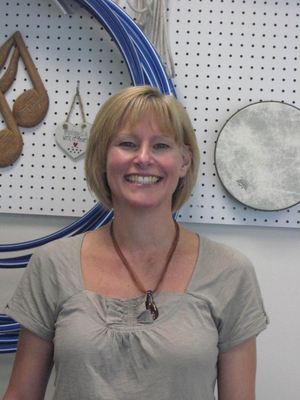As an early childhood music teacher, I am often asked to recommend the most  suitable music class for 3 and 4-year-olds. Answering that question doesn't take me very long at all: the most enojyable and educationally sound class for this particular age group is Musikgarten's The Cycle of Seasons. The following paragraphs, adapted from Musikgarten's official publications, describe in some detail the contents and purposes of this wonderful curriculum.
suitable music class for 3 and 4-year-olds. Answering that question doesn't take me very long at all: the most enojyable and educationally sound class for this particular age group is Musikgarten's The Cycle of Seasons. The following paragraphs, adapted from Musikgarten's official publications, describe in some detail the contents and purposes of this wonderful curriculum.
At first glance, The Cycle of Seasons looks a lot like music classes for toddlers. There are parents and children sitting around in a circle singing a hello song, doing a finger play, or perhaps echoing patterns. But in just a few minutes, both the look and feel of the class begins to change, and the resemblance to earlier classes is much less apparent. Depending on the personality of the class, your child may leave you and move closer to me to hear the story, for the listening lesson, or the movement activities. S/he may engage in all of these actions on his/her own, or s/he may pull you in for one or more of them. We encourage you to let your child set the parameters regarding your participation at this point; come willingly if s/he invites you, and bask in her/his independence if s/he does it on her/his own. And don’t be surprised or resistant if s/he changes her/his mind mid-way through the activity!
The Cycle of Seasons is designed to accommodate the “emerging independence of the three-year-old child”, and while you may not be familiar with this term, we’re-resized-600.jpg) sure you are familiar with this sometimes delightful and other times maddening trait you’ve probably noticed in your child. This is the characteristic that throws your formerly docile child into a tantrum when you try to help him/her zip up his/her jacket as you are rushing out the door to a doctor’s appointment. This is what is at work as your child persists in dressing him/herself, right down to putting the shoes on the wrong feet, the whole time insisting that everything is perfect. This is also the governing force when your child wants to be picked up and carried through the final circle dance in class! Your child is caught in a struggle between wanting to be independent and wanting to experience the warmth and security of your love and nurturing that was so much a part of “toddler-hood”. The “I want to do it myself” mantra that is so often frustrating to adults, is a driving force that compels children to gain necessary skills, but your child will only be comfortable progressing to the new stage of development if s/he is reassured that this progression does not mean losing everything about his/her former familiar life.
sure you are familiar with this sometimes delightful and other times maddening trait you’ve probably noticed in your child. This is the characteristic that throws your formerly docile child into a tantrum when you try to help him/her zip up his/her jacket as you are rushing out the door to a doctor’s appointment. This is what is at work as your child persists in dressing him/herself, right down to putting the shoes on the wrong feet, the whole time insisting that everything is perfect. This is also the governing force when your child wants to be picked up and carried through the final circle dance in class! Your child is caught in a struggle between wanting to be independent and wanting to experience the warmth and security of your love and nurturing that was so much a part of “toddler-hood”. The “I want to do it myself” mantra that is so often frustrating to adults, is a driving force that compels children to gain necessary skills, but your child will only be comfortable progressing to the new stage of development if s/he is reassured that this progression does not mean losing everything about his/her former familiar life.
So go ahead and let your child set the agenda (within reason!) for the role you play in this class. If you are watching your child participate without you, you can take credit for raising a self-assured three-year-old. And when s/he returns to you, welcome her/him with open arms and enjoy the moment! If, on the other hand, your child constantly wants you as a partner, relish the time together; before you know it, you will hear the familiar cry of the three year old: “I want to do it myself”!
Ann Engberg, Musikgarten Teacher at Hunterdon Academy of the Arts


COMMENTS